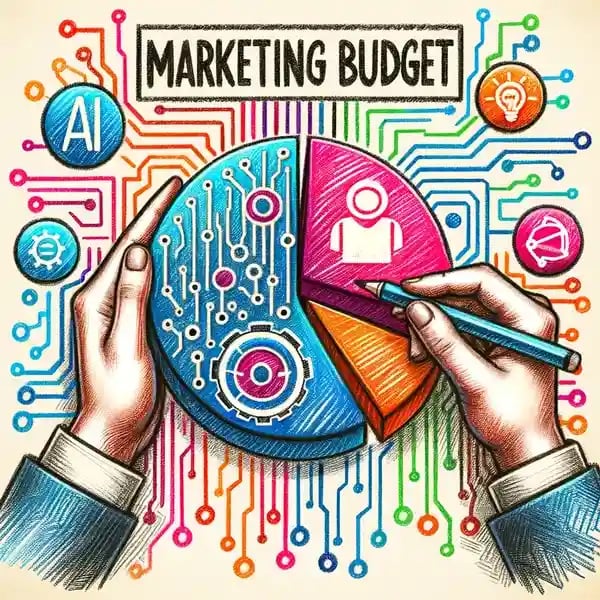How Should My Marketing Budget Change With AI?
- Home
- How Should My Marketing Budget Change With AI?
Ever wondered how a simple game of numbers can determine the fate of your business? Yes, I'm talking about your marketing budget. No two companies are identical. No two businesses are the same, and what works for one may not apply to another. Yet every entrepreneur dreams of scaling their business to unimaginable heights.
Imagine standing on top of a hill, looking down at an intricate maze representing different marketing channels - social media ads here, public relations there... It's daunting but exciting!
This post will guide you through that maze. We'll delve into using AI insights to optimize your budget and get more bang for each buck spent.
We'll discuss experimenting with AI tools without committing long-term and integrating them into existing platforms like Google and HubSpot. Expect also some pointers on content production in this AI age.
Table of Contents:
- Embracing AI in Marketing Budget Planning
- Integrating AI into Existing Marketing Platforms
- Content Production in the Age of AI
- Navigating Market Shifts with Your Marketing Budget
- Marketing Activities to Prioritize for Business Growth
- FAQs about Marketing Budget
- Conclusion
Embracing AI in Marketing Budget Planning

The strategic use of artificial intelligence (AI) can provide a competitive edge to your marketing strategy. Smart investments in AI tools can help to give your marketing strategy a competitive edge.
The Importance of Experimentation in AI
To stay ahead, businesses need to be bold and experimental with their use of AI tools. There are currently over a billion such instruments available, giving marketers plenty of options for finding the right fit for their specific needs.
OpenAI, one notable player in this space, spends $700k per day on operations—an investment they believe will yield significant returns as companies realize the benefits these solutions bring. This might seem like an astronomical sum for smaller firms or startups but fear not—there are affordable alternatives out there.
An example is ChatGPT 4 which costs only $20 per month—a relatively small expenditure when you consider its potential impact on boosting efficiency and performance indicators across all facets of digital marketing efforts.
Avoiding Long-Term Commitments with AI Tools
In the rapidly evolving landscape that is today's market, flexibility is key—and nowhere more so than when investing in new technologies like AI tools. Locking yourself into long-term commitments may hinder your ability to adapt and grow along with changes happening around you. BuiltIn
Budget planning isn't just about allocating funds—it’s also essential to developing business goals aligned with your overarching vision and mission statements. Business owners need to understand the key performance indicators (KPIs) they're aiming for and allocate their marketing spend accordingly.
As a marketing company, being open-minded about using AI tools, especially those for creating marketing budgets, is crucial. It's essential to remain adaptable to modify strategies when needed.
Embrace AI in your marketing budget planning. Don't fear the investment - it's about smart spending, not just shelling out cash. Be bold and experiment with the wealth of tools available to find your perfect fit. Remember, flexibility is key - don't lock yourself into long-term commitments that could hinder growth.
Integrating AI into Existing Marketing Platforms

The rapid advancements in technology are not leaving the marketing industry behind. In particular, artificial intelligence (AI) has started making waves by integrating into existing platforms like Google Analytics, and HubSpot. This is a trend that's bound to have significant implications on your marketing budget.
Evaluating Your Current Software Providers' Roadmap
To get ahead of this shift, it's essential to understand what your current software providers plan for their future—what we'll call their 'roadmap'. Knowing this can help you anticipate how these changes will affect both your strategy and budget.
This understanding becomes even more critical when considering the diverse range of marketing channels available today. These include everything from social media outlets like Facebook and Instagram to email newsletters or content-focused websites using SEO techniques.
Your choice of channel significantly influences the tools you need—and consequently—the overall spend on your digital strategies. For example, an investment in Google Analytics would be vital if most of your audience comes through search engine results but less so if they primarily come via direct referrals.
The roadmap evaluation should also extend beyond just one tool or platform; it needs to encompass all aspects of a robust sales funnel. So while you may be investing heavily in lead generation tactics such as PPC ads or SEO efforts, don't overlook other crucial areas such as conversion rate optimization (CRO), customer relationship management (CRM), and remarketing campaigns—all of which require different sets of AI-enabled tools integrated with various platforms.
Key stat: AI integration into existing platforms like Google, HubSpot, Salesforce, and Adobe is the future trend.
Moreover, marketing automation has revolutionized the way businesses of all sizes operate. This includes AI-powered email automation tools that can send personalized emails to segmented audiences at optimized times or social media management platforms using predictive analytics to suggest the best time to post content.
also about improving efficiency and productivity. Automated solutions help businesses streamline their processes, reducing time spent on mundane tasks. This lets employees focus more on strategic initiatives that drive growth.
Embrace AI: Tech advancements like AI are reshaping marketing. Understanding your software providers' plans can guide budgeting decisions, as different channels need different tools.
Diversify Your Tools: Don't just rely on lead generation strategies like PPC or SEO. It's important to also consider conversion optimization, CRM, and remarketing campaigns for a well-rounded approach.
Content Production in the Age of AI

The entrance of Artificial Intelligence (AI) is transforming the way we create content. With advanced algorithms, machine learning capabilities, and data processing power at our fingertips, it's high time to include this game-changer in your marketing budget.
Social media posts and email marketing campaigns can now be handled efficiently by intelligent systems that learn from user behaviour. They're not only capable of crafting compelling content but also adept at personalizing messages based on customer preferences. AI-powered social media management tools can assist in optimizing customer engagement.
In-House Content Creation
Gone are the days when companies had to depend solely on a team of writers to create their online content. Today, with advancements in AI technology like GPT-4, businesses have started developing their own in-house content creation capabilities.
This shift has brought along its share of benefits - reduced staff salaries being one among them. It’s worth noting here that teams haven't yet fully leveraged these technologies to downsize – an interesting stat reflecting our early stages in this journey towards full-fledged AI adoption.
But there's another side to this coin too. As beneficial as it may seem, implementing an entirely new tech system does come with its challenges – costs included.
Navigating Through The Costs
| AI Tool | Operating Cost per Day |
|---|---|
| GPT-4 | $20/monthly subscription fee |
| Open AI | $700,000 daily operation cost. |
of time and efficiency is undeniable. By streamlining tasks, you're freeing up valuable hours that can be redirected to more creative efforts or strategy development. The utilization of these tools can truly revolutionize your marketing squad's performance, with the return on investment being beyond worth it.
Navigating Market Shifts with Your Marketing Budget

Every year, the marketing landscape changes. To stay ahead, it's essential to adjust your marketing budget based on previous years' performance and anticipate future trends. This approach allows you to optimize for both efficiency and growth.
Download our guide: How Much Should I Spend On Marketing?
Adjusting Your Budget Based on Previous Year's Performance
A key factor in setting your annual marketing budget is assessing the success of last year’s strategies. Look at typical metrics like gross revenue or key performance indicators (KPIs). If Facebook ads performed exceptionally well last year but direct mail fell flat, consider allocating more funds towards social media this time around.
The CMO Survey, a reputable source for understanding market trends among business leaders, provides insights into how companies spend their budgets across different channels and activities. You can use these findings as benchmarks when adjusting your allocations.
One noteworthy trend that emerged from recent data shows AI tools becoming more expensive as the market matures. According to experts, costs are expected to rise due to increasing demand and sophistication of available technologies. This indicates a shift in where marketers might need to allocate resources moving forward.
Determining Future Investments Based On Current Trends
To effectively navigate shifts in the marketplace with your budget allocation, keep an eye on current trends within your industry sector - especially those driven by digital transformation initiatives such as AI adoption or advanced analytics usage. As we already know from our past analysis about tech investments - staying competitive requires constant reevaluation of spending habits based on changing circumstances; be it consumer behaviour patterns alteration due to technological advancements or overall economic fluctuations affecting customer purchasing power.
Investing in long-term marketing strategies like content creation, SEO and social media management can also yield high returns. These tactics not only aid in boosting brand recognition but also enhance your website's bounce rate - a significant performance measure that reflects the quality of user experience on your site.
Prioritizing Your Marketing Activities
are the most effective strategies to reach our business objectives?" Deciding where to invest your resources can be challenging, but it's crucial for achieving optimal results. So make sure you're considering all options and potential outcomes when setting up your marketing budget.
Stay ahead in the ever-changing marketing landscape by adjusting your budget based on past performance and future trends. Prioritize high-return strategies like content creation, SEO, and social media management. Also keep an eye on digital transformation initiatives such as AI adoption that could impact resource allocation.
Marketing Activities to Prioritize for Business Growth

Identifying the most effective marketing activities to drive business growth is essential, and involves understanding how budget allocations impact inbound marketing and brand awareness. This involves not only recognizing where to allocate your budget but also understanding how these investments impact inbound marketing and brand awareness.
Utilizing Social Media Platforms
Social media platforms have proven their worth in targeting a specific audience effectively. According to studies, businesses that use social media ads as part of their target audience strategy, experience significant growth in both customer base and revenue.
Platforms like Facebook allow you to create highly targeted campaigns based on user behavior, interests, location and more. Businesses often find value in investing a portion of their monthly marketing budget into this channel because they can easily track ROI through metrics such as website bounce rate or ad engagement rates.
Focusing on Brand Awareness Efforts
In an era where customers are bombarded with choices, building strong brand awareness has become more important than ever before. Your company's success heavily relies on people being able to recall who you are amidst all the noise.
A key way companies spend their resources towards improving brand recognition is by sponsoring local events or partnering with influencers whose values align with theirs. Another approach includes utilizing SEO tactics for better visibility online - which when done right can give remarkable results at minimal cost.
Tailoring Marketing Campaigns To Target Customers' Needs
To win over customers from competitors, brands need personalized experiences – not generic messages that feel detached from consumers' real lives. Data-driven marketing campaigns are the solution here.
For example, companies that use customer segmentation, a method of dividing customers into groups based on common characteristics like interests and demographics, have seen their revenue increase by up to 760%.
Experimenting with AI Tools
The rapid development of AI tools offers businesses new ways to connect with customers while staying competitive. These tools allow you to automate tasks such as email responses or social media posts - saving time and resources in your budget for more strategic activities.
A survey shows that experimenting and exploration with AI tools are crucial for businesses to stay competitive.
Maximizing your marketing budget requires strategic investments in high-impact activities. Leverage social media platforms for targeted campaigns and trackable ROI, focus on building brand awareness amidst market noise, personalize marketing efforts to resonate with customer needs, and experiment with AI tools for automation and competitiveness.
FAQs about Marketing Budget
What are examples of marketing budgets?
A marketing budget can include costs for advertising, public relations, content creation, SEO tools and services, social media promotion, event sponsorship or hosting.
What is a good marketing budget for a new company?
New companies should allocate around 12-20% of their gross revenue to their marketing efforts. But remember that the specific amount depends on your industry and growth stage.
Conclusion
Without an appropriate marketing budget, business success is unlikely. AI insights aren't just nice to have - they're essential in today's digital landscape.
It's all about experimentation with these tools without tying yourself down long-term. And don't forget the importance of integrating them into existing platforms like Google and HubSpot.
In-house content creation? It has its benefits if done right, especially when guided by smart tech.
Remember, market shifts are inevitable but manageable with a flexible marketing budget. Keep an eye on the previous year's performance as it could be your best guide for adjustments.
The key takeaway here is clear: mastering your marketing spend means embracing AI innovations while keeping human creativity at the heart of what you do.

